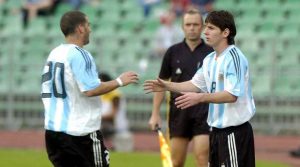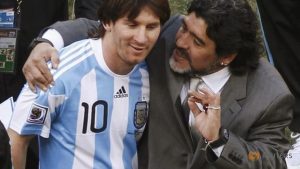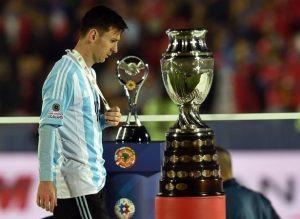Defeat. It is equivalent to a thorn in one’s side; one of the toughest realities to accept. Yet, American poet George Edward Woodberry noted that, “Defeat is not the worst of failures, but rather, not trying is the true failure.”
Considering Woodberry’s thesis, this is definitely testament to a man who continually rose above defeat after defeat, blocked out the snarling tongues of his fellow countrymen, and persisted to carry his team in the ultimate aim of winning for Argentina. A quote suitable for Lionel Messi.
Following the narrow loss to Chile at the Copa America Centenario final on penalties, Lionel Messi stunned the world by calling time on his Argentina career. Barely past his prime, a five-time Balon D’or winner, considered a phenom in the eyes of the world. Yet this little magician, this little man from Argentina, who ever so humble, was apparently crumbling.
All the accolades, club titles and world recognition, could not compare to his desire to win for his country. And failing to do so, Messi seemed to console himself in solitude, and his humility seemed to be the perfect foreshadowing for the agony which he faced on his own.

But this latest Copa America final loss in New Jersey tipped the bucket; a third consecutive finals loss in three years was all too much for the man who seemed to show no emotion. Tears pouring and inconsolable, it was finally evident that the great man was tired and consumed in his little world.
I’ve tried hard, I wanted this more than anything, but it wasn’t to be. Four finals… It (national team) is not for me. This is how I feel right now,” Messi confessed.
Whenever a player suits up for his country, he not only carries the uniform onto the field, but rather the nation’s expectations along with him. Lionel Messi is no different but in many ways he shouldered way more a burden than most professional footballers can tolerate.
Lionel Messi can literally remember all the games he enjoyed playing for Argentina. That’s how few they were. From the day he first donned the famous sky blue and white jersey, it was more about Messi winning the hearts of his fellow countrymen rather than winning games and tournaments.
When Messi made his debut in 2005, Argentine fans questioned who he was and whether he was good enough. A Barcelona player from age 13, the boy from Rosario was an unknown in his country having not played any competitive football in his native land.

“I think this is best for everyone. This is what a lot of people have wanted”, he said, referring to his retirement.
Messi had for once spoken out about his critics, those who seized on the slightest slip up or failure during his career; and fail he did, specifically on a national level.
The Copa America of 2007 gave Messi his first real taste of tournament defeat as Argentina lost the final to Brazil. Only 20 years old at the time, the young prodigy had much to look forward to. By the 2010 World Cup, he had already captured two Balon D’ors and helped transform Barcelona into a European juggernaut.
Unable to transfer his glorious club form onto world football’s grandest stage, his 2010 tournament was seen as a failure, as Messi never found the back of the net. Argentina was humbled by Germany resulting in his people levelling inconceivable criticism at him.
The 2011 Copa America warranted more humiliation. Hosted in Argentina, this was supposed to be the ideal opportunity for him to win Argentine hearts. Instead, he was once again the subject of criticism as they were eliminated by Paraguay.
Despite all that, Messi fought on. He consistently produced for Barcelona maintaining his level of performance for the next few years. At the 2014 World Cup, he proved his worth and dedication to his team and country. Recovering from injury and appearing unfit, Messi was Argentina’s catalyst as he carried his team throughout the tournament into the final.
He had done it; he would finally reach the echelons of Saint Diego Maradona. But similar to 2010, Germany was the dominant team and a wasteful Argentina could not win the game. The egregious tongues wagged again, “Maradona won us the World Cup; you’ll never be as great as him.”

Still he got up and tried again. Coming off another stellar season, “Leo” again led his team to the Copa America 2015 final. Ending the tournament as the only one to score a spot kick for Argentina, would not cushion the blow of losing to Chile on penalties.
Still, he dusted himself off. Injured at the commencement of the Copa Centenario, he reassumed his anchor role immediately upon returning to the side. On this year’s quest to achieve the ultimate prize, he attained the personal milestone of becoming Argentina’s all-time leading goal scorer. But if he could, he would give it up for that one taste of glory. Another final, another goalless encounter versus Chile, another penalty shootout.
If scoring the only penalty in 2015’s Copa offered no consolation, then blazing one over the bar certainly imploded the image of a fortress of a man; the warrior who never seemed to quit. Chile’s decisive penalty hitting the back of the net triggered the capitulation.
The world had never seen the mature Lionel Messi break down like this, and he alone understood what he was feeling. He was down, but no longer down for the fight. He never once made it about himself. No matter how he inevitably snatched the headlines, it was always about his country and winning for them. And now, the decision was imminent.

An international career that spanned just over ten overs, now regarded as short-lived although he represented his country 113 times. The Messi the world had grown to love, always filled with joy and hope had accepted the reality that he had fought against time and again; that he would never be what Argentinians wanted him to be.
Football, like most aspects of life is rather unfair. Regarded by many as a ‘once in a generation player’, Messi’s international career was always perceived by what he never accomplished rather than his commitment and consistent leadership through genuine selflessness to country.
Maybe his decision was rushed in the heat of the moment; maybe it was a long time coming. Only Messi knows. With all his frustrations, he pointed no fingers, slandered no one. Like his movement on the field, he departs with a peculiar calmness ; demanding nothing from the ones whom he had dedicated so much yet gained so little.
For the critics, this decision only fuels the fire. But for the little prince, maybe he has finally confined to the harsh criticism that he may never be truly accepted in his own country.



